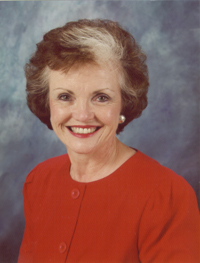 UNMC researcher Susan Noble Walker, Ed.D., answers questions about her work, life and interests.
UNMC researcher Susan Noble Walker, Ed.D., answers questions about her work, life and interests.
NOTE: This profile is part of a series highlighting the 25 researchers who were named UNMC Distinguished Scientists for 2006. Each of these researchers will be profiled in UNMC Today leading up to a March 12 ceremony to recognize their achievements.
- Name: Susan Noble Walker, Ed.D.
- Title: Professor and Dorothy Hodges Olson Chair in Nursing, College of Nursing
- Joined UNMC: 1990
- Hometown: Quincy, Mass.
Describe your research in 25 words or less.
My team’s research focuses on facilitating healthy lifestyle behavior change to promote health and prevent illness among midlife rural women with emphasis on distance delivery of tailored interventions. Our current project uses the Internet to address healthy eating and physical activity among women with prehypertension in the Grand Island area.
How did you decide to pursue this area of research?
My work in gerontological nursing led me to design interventions to help individuals to maintain health and function as they age and to avoid premature disability and death.
When did you realize you were interested in research?
My first nursing position, at the age of 20, was as a research assistant on a pain study in the department of anesthesiology at Massachusetts General Hospital in Boston. I was hooked then and my interest grew through graduate studies.
What are the greatest challenges in research today?
Obtaining continuous extramural funding to support a research program and maintain experienced staff is becoming increasingly difficult. Balancing roles as researchers, teachers and academic administrators has been constant as well, for me and my interdisciplinary team of investigators.
Best advice for new researchers?
Study an area for which you have true passion — that will carry you through the times when doubts arise about whether the demands of research are worth it — and bring you joy and satisfaction as you discover findings that will make a difference in practice. Follow through and publish, publish, publish if you hope to attract funding and to influence practice.
When an experiment stalls, what drives you to continue on?
Some projects take longer than planned but our commitment to the outcomes sustains our effort.
Who has been your greatest teacher?
I have had several, but my most influential research mentor was Nola J. Pender, Ph.D., who guided my early research career in lifestyle behavior change. I was fortunate to work with her at Northern Illinois University soon after I completed my doctorate, and to be a member of her research team that empirically evaluated and revised the Health Promotion Model of determinants of health-promoting lifestyle. That model has guided my subsequent intervention work. I learned much from her about theory, successful grant writing, grant management and career development strategies.
Tell us about your family and hobbies outside your work.
My family (sister, niece and nephews and their children) all live in my home state of Massachusetts, where I plan to return when I retire. My Omaha family includes two cats, MoonBeam and Lightning, who encourage me not to work too late at the office. My favorite pastimes are golf, gardening and enjoying the abundant arts that are available in Omaha.
Globally, describe the most notable research achievement ever?
There have been so many in so many different fields that it is not possible to choose one. How can the splitting of the atom be ranked against the mapping of the human genome, for example?
Clarify a common misconception about research?
That it is an isolating and boring endeavor. Actually, research is fun and involves lasting and rewarding collegial relationships not only locally, but. nationally and internationally. Shared passion is a great bond.
What would you tell a student interested in a research career?
Start early to develop networks with those who are leaders in your field. You’ll be surprised at how willing they are to talk about their work and discuss your questions with you. Attend scientific meetings in your field to become more aware of options for study.